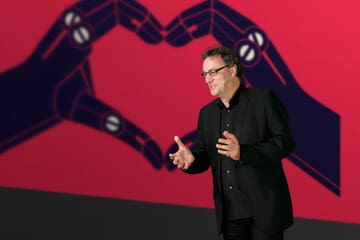"We should all take an interest in our future. It's where professionals and organisations have to evolve to remain relevant"
Gerd Leonhard, a leading futurist, shares his main observations and foresight for the next ten years and what they might imply for geopolitics, international cooperation, and the work of development actors.

cinfo’s “Immersion Days 2021” online event welcomed over 100 professionals and organisations from their Swiss headquarters or countries of operation to discuss the future of international cooperation. There were several talks by guest speakers in addition to themed workshops. Among the speakers was the futurist, Gerd Leonhard.
Learn more about the event
How should we deal with upcoming challenges and uncertainties facing international cooperation?
We are facing a future that will be more volatile, uncertain, complex and ambiguous with little influence or control over external factors. However, what you can control, is how you personally respond to those challenges. You will have to become more agile and resilient to tackle challenges such as climate change, new economic logic, or creating a fairer society. We already have the tools to face those future challenges. We don’t need to invent them; we just have to use and combine them in the most effective way. We can only achieve this through hyper-collaboration – collaboration across sectors – which requires, essentially, clear and thoughtful leadership.
We already have the tools to face future challenges. We just have to use and combine them in the most effective way.
The unthinkable is unthinkable until it becomes a reality
Adapting to a fast-changing world also means constantly reassessing and reassembling what you do and how you do it. Suppose everything around you is changing but you still continue doing the same things as before. If that’s the case, you will quickly lag behind, finding yourself in “the valley of death”, or a period of stagnation an organisation faces until they transition and adapt. To reassess, reassemble and take action is challenging but essential; it requires resilience, creativity, courage and vision. We would never have thought that collaborating purely online was possible, but, due to covid, this is what we were forced to do. It became not only doable but a reality within the course of a few weeks.
Suppose everything around you is changing but you still continue doing the same things as before. If that’s the case, you will quickly lag behind.
Gerd Leonhards' keynote
How does an organisation transform in order to stay relevant?
International cooperation will be more important now than ever – but your organisation may have to transform radically to stay relevant. But how can we do this? Firstly, taking advantage of new technologies enables more efficient processes and communication – don’t be afraid to use it. Secondly, understanding that everything is converging: private sector, state agencies, NGOs and social enterprises come together to get things done. Use this opportunity to network and collaborate outside your networking bubble. Thirdly, become more transparent. People want to see what you are doing: focus on digital communication and demonstrate efficiency and results. If you are prepared for what is coming, your donors will see your competence and give you more funds. It’s as simple as that.
Future skills and future mindset: the future belongs to those who can hear it coming
The key is paying attention to what is coming – to observe and understand what is happening right now. Dedicate 45 minutes per day by “listening to the future”, meaning reading new books and articles, listening to podcasts, watching videos etc. Pay attention and connect the dots. It often helps to take a step back to get a wider view. Some insights into a new sector or topic may give you new ideas or predictions for your own work. Social and emotional skills, as well as technological skills, are the skills of the future. Do you have people with those skills in your organisation? If not, you need to hire them!
Social and emotional skills, as well as technological skills, are the skills of the future. Do you have people with those skills in your organisation? If not, hire them!
Books and media recommended by Gerd and other participants:
- Gerd Leonhard, 2016 Technology vs. Humanity: The Coming Clash Between Man and Machine
- Anna, Hans & Ola Rosling, 2018 Factfulness: Ten Reasons We're Wrong About the World--and Why Things Are Better Than You Think
- Otto Scharmer, Katrin Kaufer 2013 Leading from the Emerging Future: From Ego-System to Eco-System Economies
- Maja Göpel 2020 Unsere Welt neu denken (Re-thinking Our World)
- Salman Rushdie 1990 Haroun and the Sea of Stories
- Kevin Kelly 2016 The Inevitable: Understanding the 12 Technological Forces That Will Shape Our Future
- Daniel Kahneman 2011 Thinking, Fast and Slow
- Rutger Bergman 2020 Human-kind: A Hopeful History
- Shawn Achor & Michelle Gielan 2016 Article: Resilience Is About How You Recharge, Not How You Endure
- Cyril Dion & Mélanie Laurent 2015 Movie: Tomorrow: Die Welt ist voller Lösungen (Tomorrow: The World is Full of Solutions)


